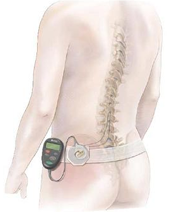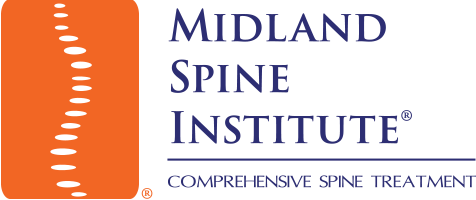Spinal Cord Stimulator / Peripheral Nerve Stimulator
 Approved by the FDA in 1989, spinal cord stimulation (SCS) has become a standard treatment for patients with chronic pain in their back and or limbs who have not found pain relief from other treatments. While the treatment does not work for everyone, most patients who qualify for neurostimulation therapy report a 50 to 70% reduction in overall pain, as well as an increased ability to participate in normal family and work activities. Many patients find that they can decrease or stop taking painkillers or other pain medications after undergoing spinal cord stimulation. Given these benefits, there has been ongoing investment and advances in spinal cord stimulation technology, and many individuals suffering from chronic pain find that neurostimulation positively impacts the quality of their lives.
Approved by the FDA in 1989, spinal cord stimulation (SCS) has become a standard treatment for patients with chronic pain in their back and or limbs who have not found pain relief from other treatments. While the treatment does not work for everyone, most patients who qualify for neurostimulation therapy report a 50 to 70% reduction in overall pain, as well as an increased ability to participate in normal family and work activities. Many patients find that they can decrease or stop taking painkillers or other pain medications after undergoing spinal cord stimulation. Given these benefits, there has been ongoing investment and advances in spinal cord stimulation technology, and many individuals suffering from chronic pain find that neurostimulation positively impacts the quality of their lives.
Electrical Stimulation Blocks the Pain Signals
In general, neurostimulation works by applying an electrical current to the source of chronic pain. This creates a pleasant sensation that blocks the brain’s ability to sense the previously perceived pain. There are two related forms of electrical stimulation commonly used to treat chronic pain:
- Spinal cord stimulation (SCS). In spinal cord stimulation, soft, thin wires with electrical leads on their tips are placed through a needle in the back near to the spinal column. The leads are placed through a needle inserted in the back (no incision is required). A small incision is then made and a tiny, programmable generator is placed in the upper buttock or abdomen (under the skin) which emits electrical currents to the spinal column.
- Peripheral Nerve Field Stimulation (PNFS). Very similar to spinal cord stimulation, peripheral nerve field stimulation involves placing the leads just under the skin in an area near to the nerves involved in pain.
In both approaches, the generator can be programmed in a way similar to using a remote control to adjust the television. The area or intensity of electrical stimulation can be changed, and the system can be turned on and off or adjusted as necessary to provide optimal pain relief. Although programming is initially done at the physician’s office, patients can learn how to control the stimulation on their own and adjust it to their pain levels.

